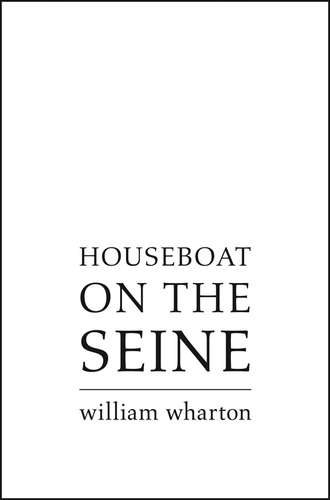
Полная версия
Houseboat on the Seine

WILLIAM WHARTON
Houseboat on the Seine

To the river we love and all who live on it.
‘Love this river, stay by it, learn from it.’ Yes, he wanted to learn from it, he wanted to listen to it. It seemed to him that whoever understood this river and its secrets, would understand much more, many secrets, all secrets.
— Hermann Hesse
Siddhartha
Table of Contents
Title Page
Dedication
Epigraph
1 Kindergarten Entrapment
2 A Brief Enchantment
3 The Cutting Edge
4 In the Hands of the Gods
5 Getting Up in the World – and Down
6 White as Driven Snow
7 The Floor Plan
8 Smoothing Things Out
9 Money Problems
10 Time Passes and Then the Gangplank
11 Family Arrangements
12 Moving In!
13 Digging Out
14 Two Holes in One
15 Dead Man Tales
16 10-Meter I-Beams
17 The Rug Merchants, Part I
18 A Wonderful Surprise
19 Bringing It Together
20 Blood in the Street
21 Impatience
22 Finale, I Hope
Also by William Wharton
Copyright
About the Publisher
1
Kindergarten Entrapment
My wife, Rosemary, was for twenty-five years a kindergarten teacher at the American School of Paris. Last year, by French law, she was forced to retire. I must say, almost everything I’ve ever really needed to know, I learned from my kindergarten-teaching wife, except somehow, she never taught me how to live on a houseboat.
About twenty-five years ago, she worked with a lovely woman named Pauline Lee. Pauline taught first grade next to Rosemary, and lived on the Seine in a houseboat. The houseboat was located in the small village of Le Port Marly, not far from Versailles and St Germain-en-Laye, ten miles west of Paris proper.
One day, Pauline suggested that the kindergarten and the first grade go out on a field trip to visit her houseboat.
My wife was enchanted with what she saw. I don’t really know if the kindergarten children were – that’s not my concern. My main concern is my wife, and she’s something to be concerned about. Anyway, she came home all excited and wanting to live on a houseboat. That sounded crazy enough, but was OK with me. Rosemary is subject to these impulsive, out-of-this-world decisions, and I’ve learned to go along for the ride.
‘Just tell Pauline to keep an eye out in case there are any cheap boats available, dear.’
I’d had a few good painting sales for a change, and was feeling relatively flush. Oh, how easily one can dive in over one’s head … literally! My problem was I didn’t actually believe any of this was for real.
Three weeks later, Pauline calls to tell us a houseboat only four boats toward Paris from theirs had burned to the waterline over New Year’s Eve, and she thought it might be for sale. We contact the owners, and sure enough it is. And I might say, for good reason, more good reasons than I could possibly realize.
That weekend, we drive out to look at this boat. It’s a beautiful day, and I’m thinking that maybe we can take a nice walk in the forest at St-Germain-en-Laye. We stop by Pauline’s, and she points out the boat that’s for sale.
We thought we would be having Pauline as a neighbor, but it didn’t work out that way. Bob, her husband, had been very much involved with the students during what the French call ‘Les Événements de Mai’, that is the Student Revolution. When all the smoke died down, Bob was asked to leave by the administration of the school where he worked, The American College of Paris. He not only left the job, but he and his wife left the country as well. They went back to Michigan, where Pauline is again teaching.
We look over the quay down a muddy hill to the water. This is a flat-bottomed wooden boat, sixteen feet wide by fifty-four feet long. It’s actually more like a house than a boat. It has no real bow or stern. It’s just rectangular and flat. There’s no motor, no sails. It has wood siding with windows, the kind you might find in any ordinary house. It even has shutters on the windows. I’m thinking, where are the portholes? Pauline explains this boat had been built on an old sand barge by a French Arctic explorer named Victor Émile, sort of a French version of Admiral Peary, for his lady friend. That sounds romantic enough, but this boat isn’t very romantic now.
Pauline has the key, so we walk down the squishy quay on stone steps, then up a small gangplank and into the boat. It’s completely smoke-damaged, the ceiling’s burned out with bare electrical wires hanging everywhere, and most shockingly impressive … truly burned down to the water on the river side. The water laps into the boat when scullers swish by. These turn out to be the main traffic on this dead arm of the Seine where the boat is located. There are about a dozen or so houseboats in this area, protected by an island in the center of the river. The advantage is the houseboats do not bounce with the backwash of each huge barge as it hauls cargo from Le Havre to Paris and back.
Pauline explains all this with verve and enthusiasm. I just want to hop back in our car and go for a walk in the forest. But our children are as enchanted as my wife. Now, this would be exciting living, not the way it is in dirty old Paris. Can you believe it? I swear, this damned boat is bewitching, or maybe our children are getting too blase!
‘Smell the air, Dad, how great it would be to live out here after all the pollution in Paris.’
I sniff. It smells like an open sewer to me. This was over twenty-five years ago, and at that time, the Seine was virtually an open sewer. Paris and all the villages along the river down from Paris, in a beautiful, long, meandering curve, were dumping raw sewage directly into the river. Naturally, this boat is downriver from Paris!
To make everybody, that is, wife and kids, happy, I put in a ridiculous, insulting bid for this crippled wooden hulk. We go for our walk, and I’m ready to forget about the whole thing.
A week later, I’m shocked when my bid is accepted. Accept is mild – they jump at it. Yet, little as I bid, I must borrow money to swing this cockeyed, insane deal. Painters are rarely rich, or even reasonably comfortable. I often challenge friends to name fifty American painters making a regular living painting – not teaching, or working in TV or films, or in advertising – just painting pictures and selling them. Sometimes, there will be a flurry for a particular painter, but it rarely lasts more than a few years, then it’s back to the old easel and bean soup, especially if a painter happens to have a family. No one has ever come up with more than twenty who are truly making it. But it is a great life. So it goes.
For the next three months, my painting is suspended in the interest of romance, excitement, adventure, WITCHCRAFT – such an important change for a man who lives in the streets or out in fields and likes it. I’m feeling caught up in something wicked. I am! I’m not a river man. The Seine, for me, is something to paint. It is constantly moving, changing, at the same time it is still, like a good model.
Our lives up to this point have been something of a dream. I was an art teacher in the Los Angeles City Schools until 1960. Then, since I saw myself as an artist, not a teacher, we came to Europe. One of the main reasons was to keep our children away from American television. Also, at that time, living was cheaper here.
First we lived in a very small apartment in Paris, three hundred square feet, which we bought with my retirement money from the Los Angeles schools. We were very mobile, Paris in spring and fall, Bavaria in summer and for Christmas, then southern Spain for winter. It sounds like a millionaire’s life, but we were doing all this on three hundred dollars a month, plus my disability pension from World War II. Yes, if you’re careful, it can be done. For us, the poverty line is way above our heads.
When we had three children, we moved into an old carpenter’s workshop that we fixed up as an apartment. When I say ‘we’, I mean anyone in the family who could swing a hammer or spread paint with a brush. It was something like the boat project, mostly a family affair.
2
A Brief Enchantment
First, I build up that side with the water sloshing in. Then I clean out and scrape or scrap all the charred interior. This involves, among other things, replacing forty-five small mullioned windowpanes. There are also two huge plate-glass view windows that are so smoke- and soot-covered, nothing can be seen through them – two more days of scrubbing there. The walls of what served as a living room and bedroom are beyond mere painting; they will take more serious treatment.
I find a bolt of gold brocade cloth at the Marché Aligré, a street market near our apartment-cum-studio in Paris. For some reason, this brocade is only about the price of burlap, so I buy it all, three bolts full. I begin to know I’m going crazy because I look forward to sticking this cloth over all the black walls and ceilings. I’m being carried away. Perhaps the entire boat is enchanted.
I use paste to cover the walls and ceiling so I can attach the gold brocade – it does cover a multitude of sins. I buy inexpensive light fixtures with amber lightbulbs, and, after some considerable electrical work, much beyond my skill level, manage to fix them so they actually light, even turn on and off with primitive switches.
I call in the rest of the family on weekends to scrub out the bathroom, the kitchen, the usual comfort necessities. These are all a uniform smoke-brownish hue. Before the school year ends, late in June, we have the boat finished. According to my wife, it looks like a drunken pirate’s private whorehouse – she’s very conservative in these kinds of things.
The layout of the houseboat is quite simple. After one comes up the gangplank, one goes through a low oaken door, about five-feet six-inches high. I’m five-foot-ten. After bumping my head the tenth time, I consider wearing a hard hat permanently, or maybe an old-time bowler.
The door opens onto a tiny vestibule. Turning right, one goes through two swinging mahogany doors with beautiful brass fittings, very boatlike. These doors lead down two steps into the main room. On the left, looking out over the river, now, after much scraping, is one of two large plate windows. It’s about seven feet wide and four feet high.
The living room is approximately twenty feet long and fifteen feet wide. At the far end, on the river side, is an entry to a small kitchen. In the center of that end wall is another pair of mahogany doors like those opening from the vestibule. These doors lead to a narrow hall with a bathroom, complete with toilet, sink and shower, opening on the right, the shore side.
Directly ahead are three steps up to the bedroom. Here we find the second of the large plate windows, also looking out on the river.
All along the shore side are small windows, four in all, opening onto the quay. These are house-type windows with shutters. There is also a window of the same design opening onto the kitchen on the river side.
It must have been a lovely place for the French explorer and his lady friend. I’m not sure how it’s going to work with a family of five, though.
We rent the boat out for the summer to a young woman (another witch) who works for the Foire de Trône, a sort of yearly carnival in Le Bois de Vincennes. My contract for our boat location stipulates someone must be on the boat at all times. The river-navigation people are already very suspicious of this crippled craft.
We leave for our usual summer vacation to the old water mill we’d bought in Burgundy when we first came to France. We paid the huge sum of two thousand dollars for this place. It was another romantic coup de foudre. Actually, the mill is only a three-hundred-year-old stone tent, but that’s another story.
Disenchantment!
We hadn’t been at the mill three weeks when we receive a telegram, our first French telegram. It’s from an elderly English couple who live two boats downriver from us. I don’t know why they wrote it in French. It says:
Votre bateau a coulé.
That’s said coo-lay, as in Kool-Aid.
I run across the street to a French neighbor hoping to find out what the word ‘coulé’ means. As if I didn’t know! I just don’t want to believe it.
I immediately take the train up to Paris, then the bus out to where the boat is. It is, indeed, coulé. Only a small corner of the roof is sticking above water. There is a medium-sized crowd along the bank. They surround the boat, babbling in French. Each seems to have a different idea as to why the boat has sunk. All of them, in French fashion, are convinced there must be a reason, C’est logique, n’est-ce pas?
After much running around, trying to find someone to lift the boat out of the water and getting nowhere, someone tells me about specialists in this kind of work, bringing up sunken boats. They are called les frères Teurnier. I phone them from the café on the corner. This town of Le Port Marly has seven restaurants, but only one café. It’s directly across the street from the boule courts, which are on the chemin de halage, or path, next to our boat. There are also two restaurants de routiers, sort of truck stops that double as cafés.
The next day, a broken down old ‘deux chevaux’ pulls up on the chemin de halage beside the boat. I’d camped, somewhat chillily, on la berge overnight. The man who climbs out of this car is in his sixties and about five feet tall. He’s wearing French workmen’s blues, filthy, stiff with oil and sweat, and a mariner’s cap, also filthy.
He shakes my hand, jabbers away, smiles, then pulls down a plank from the top of his car. He slides down the steep riverbank and throws the plank out across the water, between the land and the projecting bit of boat roof. I’m convinced he’s going to sink the whole business, but he walks like an acrobat, muttering to himself, out on that board. After looking down all sides of the boat, seeing I can’t imagine what, except dirty, black water, he comes back to me and, in a complex mixture of Breton, French, my broken French and his violent pantomime, I come to know he thinks he can raise the boat for two thousand francs (at that time about four hundred dollars).
This represents the amount we still owe on the boat and were hoping to pay off in September. I actually have it in my pocket in one-hundred-franc bills, twenty of them, plus some change. At the moment, it represents virtually our total capital.
In French and in pantomime again, he tells me he will wrap the boat with a large cloth, then pump the water out so the boat can come to the surface and we can see what’s wrong. It sounds crazy. However, he insists that before he can put the pumps in the boat to pump out the water, I must go down inside and remove anything floating in there. If I don’t, they’ll jam his pumps.
With this advice, he leaves, promising he’ll be back in three days to commence the rescue operation.
Losing My Suntan
I look at the boat. It’s noon, the bells of the village church are ringing. I figure I might as well start right off. Luckily, the crowds have diminished. In the bright sunlight, I strip down to my Jockey shorts and slide into the water. Happily, as a last-minute decision, I’ve also brought along from the mill a waterproof flashlight, a Christmas present for Matt, our fifteen-year-old son.
Usually we leave the key right in the boat door. When I’m feeling around in the blackness of water, holding my breath, I find the key. Our renter must have left it there, too. I’m half afraid to go in, expecting she might still be inside, floating, bloated, in our living room.
I turn the key and the door opens sluggishly. I come up inside and there is an air pocket. M. Teurnier had said there probably would be. I take a deep, ghoulish breath and look around. It’s dark and things are floating around as he expected, but no bodies, yet. I flash the light around the dark interior. My God, the place is filled with junk: floating doors, cabinet doors, real doors; pillows, mattresses, papers, furniture, bits of furniture; all floating in the dark. Also, there are other things floating, things I hadn’t expected, though I should have. I strap the flashlight to my head with a torn piece of wet sheet and get started.
I spend the rest of that day pulling out the floaters and spreading them on the bank. Chairs, tables, anything held together with glue, are no longer in one piece. I fish away, in and out, down and up, until dark settles over all and fatigue drags me to the ground.
Just before the bakery closes, I buy a baguette for dinner. I sit on the berge and watch the sun go down behind me. The temptation is strong just to walk away and allow someone else to deal with this mess, write it all off.
The evening is warm. I curl up and fall asleep. But I wake in the middle of the night with severe stomach cramps. My baguette goes out the way it went in and, simultaneously, the way it should come out. I accompany these gratuitous acts of my body with much grunting, groaning and feeble whining.
When the morning finally comes, I put on some clothes and walk across to the Café Brazza, the same one Alfred Sisley painted several times when the river was in full flood. I’ll never look at those paintings the same way, beautiful as they are. I use the café phone to contact a farmhouse with the only phone near our mill. They’ll pass on a message to my family that I’m all right, but I’ll be staying up here awhile, trying to raise the boat. It sounds so simple. I give the message on the edge of tears, tears of self-pity.
Back on the berge, I start my diving again. I’m now having the heaves out both ends. I didn’t know this was possible. There’s nothing in there anyway, and the river wouldn’t mind if there were. I’m as polluted as it is.
I don’t eat lunch. It seems like suicide, and, as I said, I’m very short on money. Who’d pay for the funeral? Then I notice that my skin is peeling off in great slabs. I’m baby pink underneath. My beginning summer tan is turning a gray-black and slipping away. It falls off my head and face and droops like a veil over my beard. I feel miserable, shaking inside and trembling outside. But I am pulling the last floating things from the boat. After that, I’ll have a day or two of rest. I’m having blackout spells. Time mysteriously passes, and I find myself on the ground. For some reason, it doesn’t seem serious to me, that’s how far gone I am.
The Royal Mounted Police Arrive
The next part of this tale I didn’t experience directly. I was told about it ten years later under unusual circumstances.
A Canadian-American family had rented a boat downriver, the same boat Pauline and Bob had rented. They were walking their five children along the chemin de halage. This is a dirt road beside the river, which, in the old days, was used for horses and mules to pull the barges up to the locks in Bougival. The barges were much smaller in those times.
This family, out for a walk, looks over the edge of the berge and sees me, virtually naked, curled in the fetal position and moaning. The children insist their parents check to see what’s the matter.
They’re shocked when I look up at them, or at least seem to, and speak English, American English. I don’t remember a thing, not what I said, none of it. The entire family, all seven of them, drag me down to their boat, actually carrying me part of the way. They put my heaving hulk into a bunk bed and try forcing food into me. Carol, the wife, pats cold cream over the bare red patches of my body.
They’re sure I’d just managed to survive from the sinking boat they’ve seen in the water behind me. I remember none of this, either.
I stay with these kindly people on their boat that night and the next day. But, on the third day, I’m conscious enough to explain the situation, how M. Teurnier will be coming to raise my boat and will be needing me.
I force my way onto my feet groggily and stagger back to the chemin de halage, thence to the berge with the sunken barge. M. Teurnier and another man are already there. They have a truck pulling a small boat on a trailer. They stare at me. My basic French isn’t enough. Don, the Canadian husband and father of the family, has come with me. He’s afraid I’ll collapse. He speaks French well – at least it sounds good to me. This part I can vaguely remember.
It turns out the river here is filled with sulfuric acid dumped at the Renault automobile plant upriver. M. Teurnier had assumed I knew this and so would be using a wet suit when I went into the river. He and the other man both look surprised that I’m alive. I know I must look like Lazarus risen from the grave with my gray skin flapping in pieces like a rotted grave shroud around me.
They go to work immediately, Don helping where he can, while I stumble weakly around trying to be of some assistance. They nail a large canvas tarpaulin all around the roof of the boat, letting it float down with weights along the sides. Then they set up a humongous pump and begin pumping. Water spurts out of a six-inch-diameter exit pipe. It shoots up into the air and splashes down into the river with a tumultuous, continuous crashing noise. A crowd has gathered again to watch the excitement. In the mêlée, I can’t find Don. Later, I discover this was the day they were scheduled to depart, and despite the complaints of their children, he couldn’t stay. I’ve lost my translator and trusty worker, and don’t see him again for twenty years.
The pump spouts water continually, but the boat, despite all this feverish activity, rises only a few inches, then settles back on the bottom, not unlike a beached, dying whale I once saw in California. They turn off the pump. I understand M. Teurnier saying to his brother that it must be a huge hole. They set up a second pump with an exit spout twice the size of the first. They turn this one on, and, with the two going, the boat makes a tremendous effort. The pumps make a horrendous racket, but the boat rises only slightly, then with what appears an overwhelming fatigue, settles back to the bottom. I’m weak and feeling much the same as the feelings I project into the boat.
Les Scaphandriers
Next, M. Teurnier begins to dress in a genuine diver’s outfit, a heavy canvas suit with oxygen tanks to feed a brass helmet over his head and face. He walks into the water, wearing weights around his neck, checks his hoses, pauses as his brother screws the helmet onto the top of the suit and clamps it. M. Teurnier signals with one finger to start the oxygen flowing and walks down and in, I presume through the same door I’ve been slogging in and out of during the few days I could work.
He comes back to the surface every fifteen minutes or so and tells us with hand signals and head shaking that he’s found nothing, no hole. He gives the signal to start the smaller of the two pumps. Water is rushing out again. This time, after only about five minutes, he comes staggering up the slippery bank clasping something in his left hand. His brother turns off the pump and opens the helmet.







